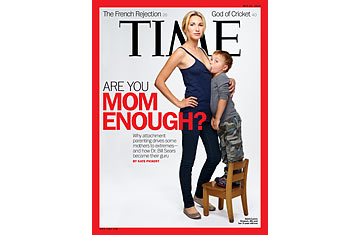
(4 of 5)
Although Sears' guidelines for round-the-clock maternal devotion have drawn ire, it's hard to argue with his overall message that babies who are cuddled feel secure. He surely deserves credit for promoting breast-feeding and the idea that the bond between mother and baby is critical. At the same time, though, his homespun language and sometimes vague or contradictory statements can muddy things, leaving mothers to overlook the nuances and take an all-or-nothing approach.
Mothers seem divided into several camps. Some, like Joanne Beauregard, fully commit to the Sears model, attend to every whimper, stay home and happily cuddle their babies 24 hours a day. Sears has become a hero to this set. Jamie Lynne Grumet, a 26-year-old mother of two in Los Angeles who breast-feeds her 3-year-old son, says of Sears, "He has a very gentle spirit, and I find what he's saying to be nonjudgmental and relevant." Other mothers — particularly those who work or have multiple children — endorse the idea of maternal closeness (who doesn't?) but think Sears is out of his mind. Modern parenting literature, after all, is full of advice about getting babies on manageable schedules, a Sears no-no, and baby stores are brimming with devices in which parents can park their babies to get much needed breaks.
A third category includes mothers caught in the middle. These parents try to achieve Sears' ideal of nursing, baby wearing and co-sleeping but fall short for some reason and find themselves immobilized by their seeming parental inadequacy. They suffer from what two New York City parenting consultants call "posttraumatic Sears disorder."
Maybe these parents just take Sears too literally. "When somebody says attachment parenting, what comes into my mind is a mother with a newborn on one hip, a 2-year-old on the other hip and a 3-year-old on her back. And she hasn't taken a shower in a week and a half," says Jim Sears, the Searses' oldest son. "My parents really didn't do that, even though a lot of their readers ended up doing that."
In his newest books, Sears added sections devoted to balancing mothers' and babies' needs. This was, he says, in response to the bleary-eyed moms who streamed into his pediatric practice after the first edition of The Baby Book was published. Sears tells mothers, "Do the best you can with the resources you have"; he tells husbands to book massages for their wives and shoo them out of the house so they can get a break from parenting.
Much of Sears' instruction for fathers revolves around the supportive role they can play for their wives. Do the dishes so mom can focus on breast-feeding, is a typical piece of advice. But Sears also encourages "attachment fathering," pointing out that dads can wear their babies just as well as mothers.
Still, it's easy to see shades of sexism or naiveté — which one, it's hard to say — in Sears' chapters on working and parenting. Even Jim, who's divorced and stars on the television show The Doctors, says that before his wife had children, she "was very career-oriented," but this changed "once the baby was on the way and the hormones kicked in." Jim's ex-wife gave up the corporate career she had before their children were born for a less demanding job that allowed her to bring her babies to work. Sears also encourages mothers to start home businesses instead of heading to the office every day and describes his baby sling as a convenient hands-free device that's "work and wear." He says about 60% of mothers with children in his pediatric practice work outside their homes, and indeed, some career mothers are drawn to an attachment-parenting model that helps them get close to their babies when they finally come home from work.
But does Sears really believe it's O.K. for moms to work? A 1997 evangelical version of The Baby Book called The Complete Book of Christian Parenting & Child Care, which the Searses say they wrote to counter the fire-and-brimstone, discipline-oriented message evangelical parents were used to, includes a chapter called "Going Back to Work?" that says, "[Some] mothers choose to go back to their jobs quickly simply because they don't understand how disruptive that is to the well-being of their babies. So many babies in our culture are not being cared for in the way God designed, and we as a nation are paying the price."
Sears says his thinking has evolved since then. He says the calls he gets from reporters almost every week asking about the plight of the working mom annoy him — immensely — and that such critiques are a gross oversimplification of his message. Yet alongside advice about balance, the Searses also suggest mothers quit their jobs and borrow money to make up the difference. The couple subsidized their sons' wives so they could stay home with the Sears grandchildren. Says Martha: "It was the least we could do."
